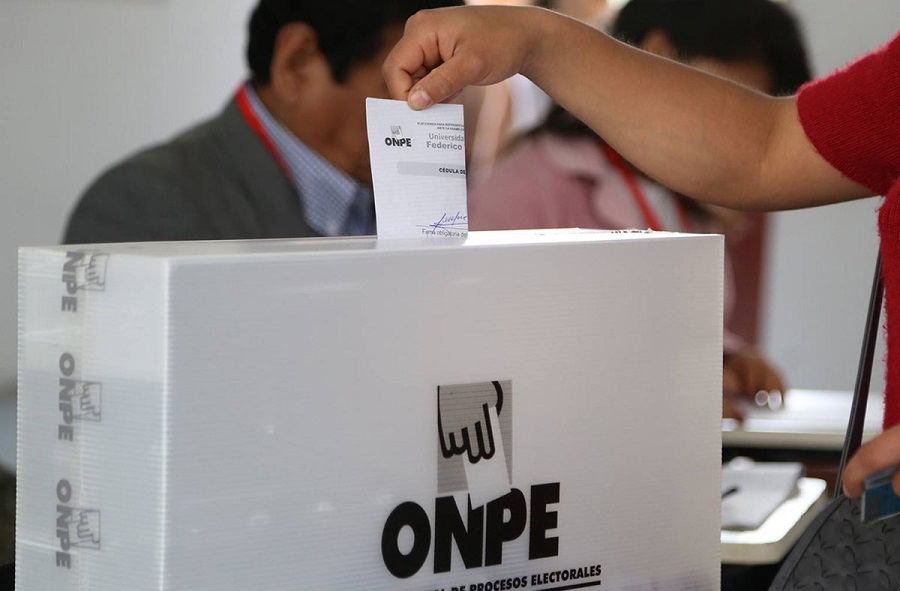RIO DE JANEIRO, BRAZIL – Peruvians will turn skeptically to a close presidential election disappointed by a recurring governance crisis, corruption cases against its last six heads of state, and the collapse of the economy due to the pandemic.
The world’s second-largest copper producer has at least five candidates fighting to advance to an April 11th runoff, with little support as a sign of distrust, while a majority of voters have yet to decide who to back, according to polls released over the weekend.

Populist Yonhy Lescano, with a left-wing economic and social conservative profile, remains on top with just 12.1% according to the Ipsos firm, with liberal economist and former advisor to several governments Hernando de Soto, leftist Veronika Mendoza, former soccer goalkeeper George Forsyth, and right-wing Keiko Fujimori close on his heels.
The ultra-conservative Rafael López Aliaga, seen as the Peruvian version of Brazil’s Jair Bolsonaro, fell in the polls but could recover considering how volatile voters are.
“It is unprecedented in the history of Peru, since polls have been measured, that so few days before the elections the main candidates in their voting intentions have such a low percentage of support,” Jeffrey Radzinsky, a master in governance and public management, told Reuters.
Peru experienced one of its worst political crises in recent years in November with the removal of a president, the resignation of his successor, and another by Congress’s appointment, after fierce protests that left two dead in the midst of a resurgence of the coronavirus pandemic.
They are waiting for a savior. Although the uncertainty has since dissipated, the country is burdened with investigations of bribery and abuse cases by its leaders, which began in 1990 with the imprisoned former president Alberto Fujimori for violating human rights.
They were followed by Alejandro Toledo, who faces extradition from the United States; Alan Garcia, who committed suicide to avoid capture; Ollanta Humala, who wants to return to lead the country; former banker Pedro Pablo Kuczynski, in house arrest; and the ousted Martin Vizcarra, who is seeking a seat in Congress.
“There is skepticism and a lack of credibility in all politicians; there is no one who will tell you the truth,” said Rosario Chavez, a housewife, while shopping in a crowded Lima market despite restrictions due to the coronavirus.

Added to this scenario of anger against the political class is a deep economic crisis, the worst in just over three decades with a drop of 11.12% last year, induced by an extensive quarantine in search of curbing the pandemic.
With hospitals saturated with COVID-19 patients, the arrival of vaccines in dribs and drabs, and a record number of infections and deaths in the second wave of the virus, Peruvians’ impotence and disgust towards their leaders seems to be growing.
“Peruvian voters are not only fed up with their politicians,” said political scientist Fernando Tuesta, of the private Pontifical Catholic University of Peru. “But every time the idea is renewed that someone different, who comes from outside politics or who has little experience, can open the way to a certain prosperity, and that has not happened,” the analyst added.
Most of the candidates are well-known personalities who have held public office or business people with electoral experience. Some have burst onto the scene with radical proposals. The first six candidates in the polls, except for the leftist Mendoza, are considered friends of the free market.
Necessary consensus. Uncertainty has hit the local currency, the sol, which trades at historically low levels against the dollar. However, it is also due to the external context amid fears of a pandemic’s global recrudescence.
“Weak support for any candidate and party is resulting in significant uncertainty, which is contributing to the depreciation of the Peruvian nuevo sol,” said a report on Peru last week from rating agency Fitch Ratings.
Sunday’s elections will also choose the 130 members of Congress, which is expected to be highly fragmented with left-wing, right-wing, and even religious positions, a horizon that the next president will have to deal with to reach agreements and implement his political agenda.
“It will not be easy,” said analyst Tuesta. “This is politics; these pacts are for governability and are necessary for democracy,” said Radzinsky.

Some candidates have promised to eradicate corruption in the country of 33 million inhabitants, with proposals for the death penalty for officials who accept bribes or “civil death,” prohibiting them from working in a public entity.
Lopez Aliaga, of Opus Dei, has said he will expel from the country the Brazilian construction company Odebrecht, whose bribery scheme involved the last four governments.
The campaign has been austere, without rallies due to the pandemic’s limitations, although in the main streets of Lima and the country have proliferated huge posters with electoral propaganda. In the only official debate of candidates last week, social networks were filled with jokes about the postulants’ political differences and did not highlight their proposals.
“I don’t believe in politicians because they offer to get to power, (and) being in power the bribes begin. We want new people, one who is not muddy from politics,” said Raul Hernandez, a retiree walking through downtown Lima.
Source: America Economia

